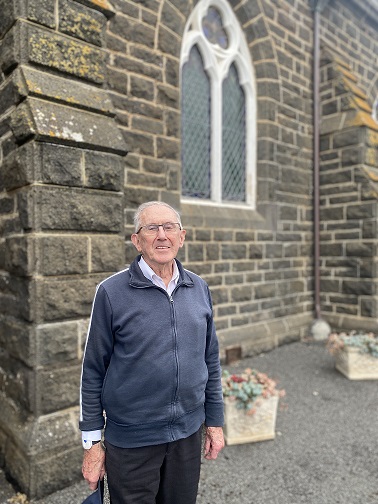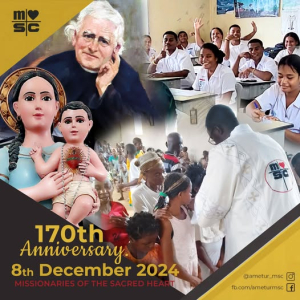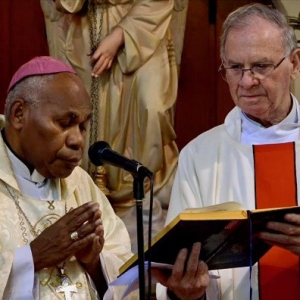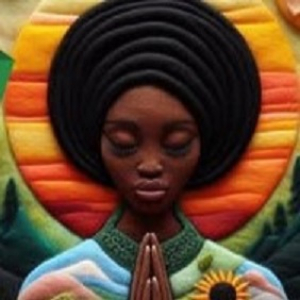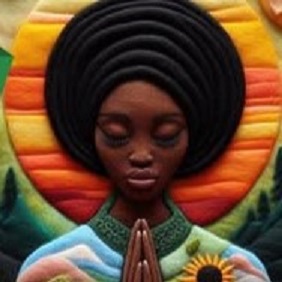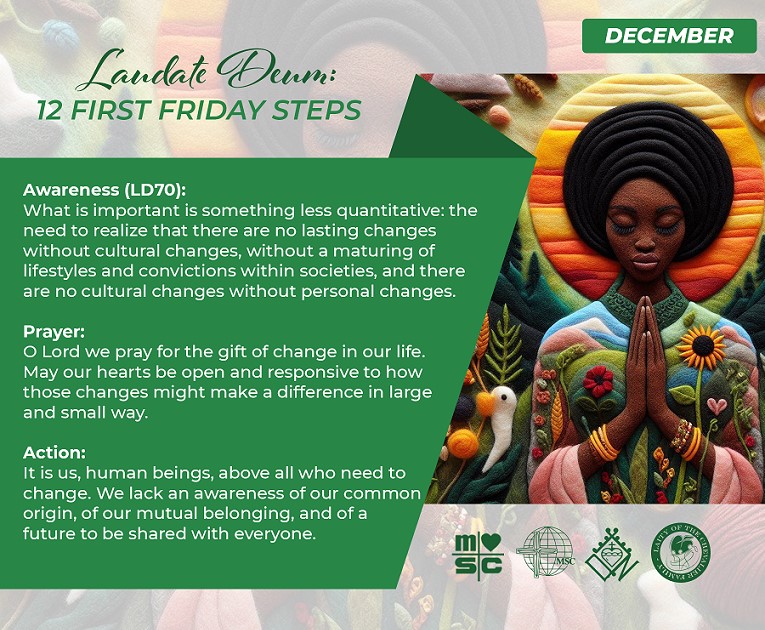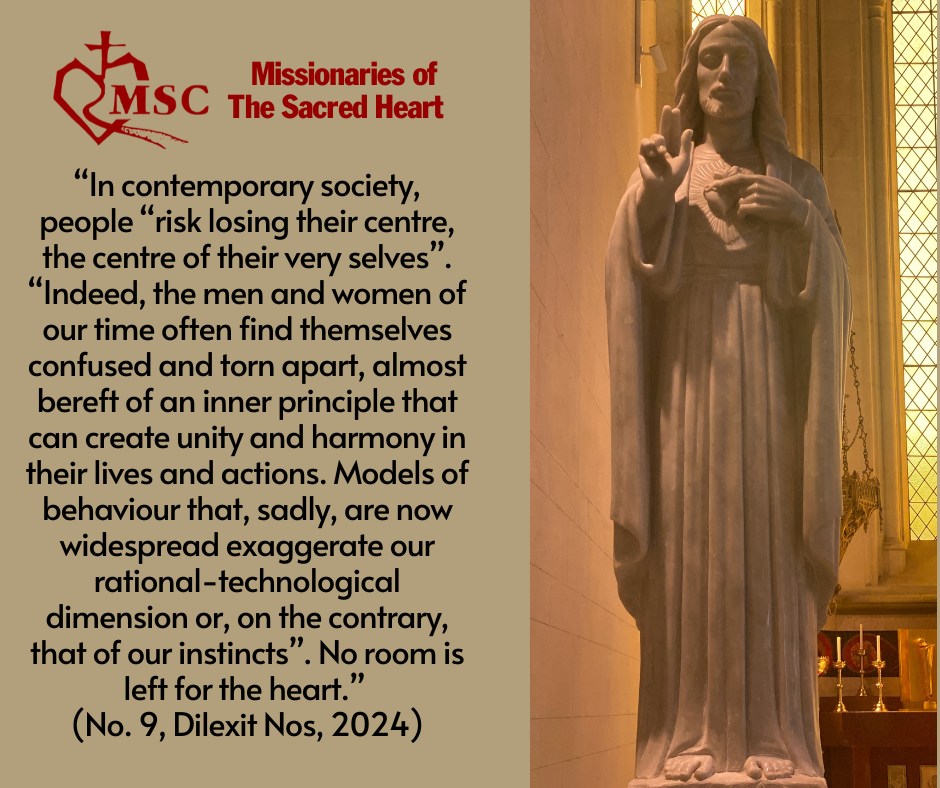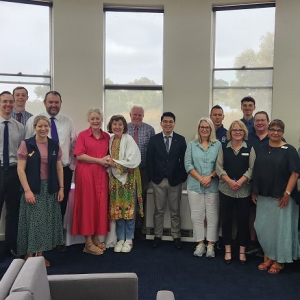Peter MALONE
MSC, 1854-2024, 170 years of heart-life and mission
MSC, 1854-2024, 170 years of heart-life and mission

More reasons to celebrate these 170 years with enthusiasm: From the Anniversary letter of our Superior General, Abzalon
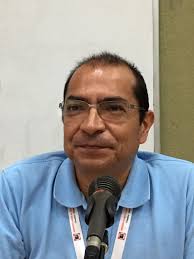
* The implementation of two MSC facilitators’ programs in English in Rome and in Spanish/Portuguese and Brazil.
* The International Meeting of the Laity of the Chevalier Family in the Philippines.
* The continuity one, prayer is giving to the Centre for the Poor-CEPAGCO in the Philippines, as its director has begun to promote JPIC at the Congregational level.
* The Ministry of one MSC Brother in Vietnam who works as a chef in a boarding school where 700 meals are prepared three times a day. There, in the midst of pots and pans, the MSC Spirit vibrates.
* The birth of the new MSC Province of India, just 170 years after our foundation and its upcoming missionary project in Ireland and France.
* The second newest Province, the Pacific Islands Province, will soon be opening a community in New Zealand and another in France.
* The presence of the Francophone African Union in France and in the Brussels City Centre where two Congolese MSC and an 84-year-old Belgian are staying at the "foot of those excluded from the system".
* This energy is also evident through the courage of the MSC entities in the Netherlands, Belgium, France and Italy as they dream of an MSC Union of Europe, even with the ageing challenges. Our delegate for this project is taking steps through listening to each member and the leaders of these places, which gives us plenty of reasons to celebrate these 170 years of missionary life.
* Five retreats will be held in the Australian province, supported by a member of the General Team, to deepen their awareness of being Gifted and Blessed as MSC.
* There is new energy in the General Administration infused by young and renewed members, together with the dedication of the Communications, Safeguarding, Finance, Ongoing Formation, and JPIC Commissions, enabling us to better serve the Congregation.
- Further times of celebration include the 100 years of MSC presence in the Democratic Republic of Congo, the new formation community in Kenya, the courage of the Spanish Province in "letting go" of two historic MSC works so that they can "let come" a new reality with hope, and the two international communities in Issoudun, France, and Kiel, a suburb of Antwerp, Belgium.
- The process of reconfiguration and transformation being undertaken by the MSC territorial organisations – CAMSC, APIA, and PEC – and the ongoing project to establish AFMSC in Africa, fills us with energy and dynamism, providing us with reasons to celebrate this anniversary.There is a video message from Abzalon:
Paul Guy MSC, Requiem Mass and Burial
Paul Guy MSC, Requiem Mass and Burial
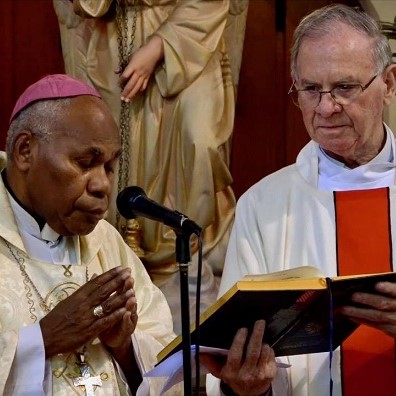
Peter Guy MSC with Rochus Tatamai MSC and confreres.
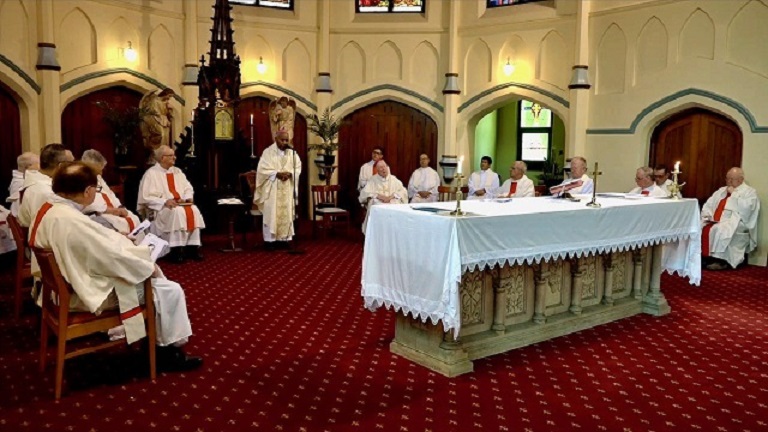
Reflection by Rochus Tatamai MSC, former Bishop of Bereina, now Archbishop of Rabaul.
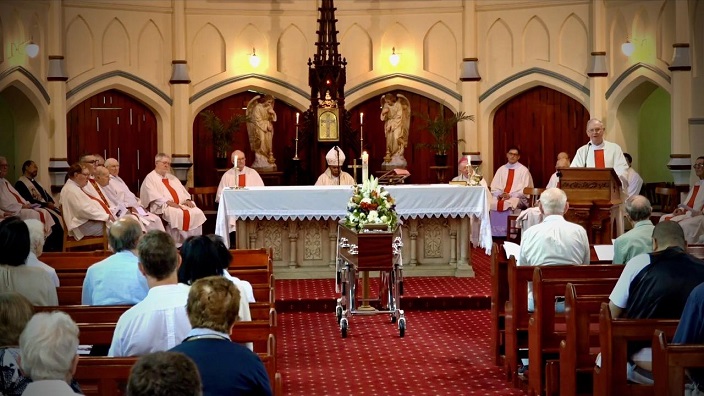
There's a lot to reflect on and contemplate upon today as I personally recall Fr Paul Guy MSC, my elder brother in the faith, an MSC confrere in Religious Life, a brother priest sharing in the Priesthood of Jesus Christ, my mentor and Spiritual Director as pilgrims on earth, my confessor and Confidant in the discernment process searching out God's Divine will, my best friend and colleague in recreation and light moments, the person whom I fondly addressed as "my lord", even as a younger and inexperienced priest just beginning the initial steps going forward as an amateur shepherd in the vineyard of the Lord at St Joseph's Parish Boroko,(1990-1992) Port Moresby NCD. PNG.
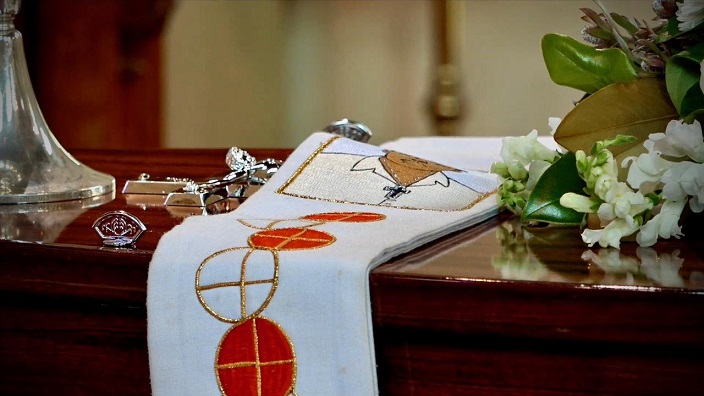
Even when I prematurely resisted and pleaded earnestly against the then Provincial Superior late Fr Neville Dunne MSC not to be appointed to a city Parish let alone to be Assistant Parish Priest to Fr Paul Guy MSC at St Joseph Parish Boroko, Fr Neville Dunne's humble appeal to the young Rocky then 1989/1990 was " Rocky, please don't cross your bridges even before you in fact even crossed them". That response was an honest and challenging feedback that easily melted my hard-hearted heart to succumb to the prompting of the Holy Spirit "to swallow my personal pride and resistance and humbly accept my official appointment to St Joseph as Assistant Parish Priest and Vocations Director of the MSC PNG PROVINCE (a position I held from 1989 - 1997 @ 8 years in total).
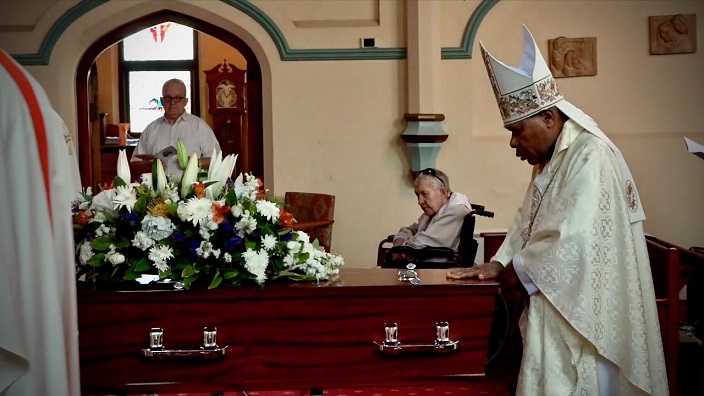
During my years as a young priest especially 1990 - 1995, Fr Paul Guy MSC played a vital role as a companion and mentor who always respectfully and sometimes teasingly fondly would address me as "my lord" an address person to person we both mutually exchanged with respect and high regard.
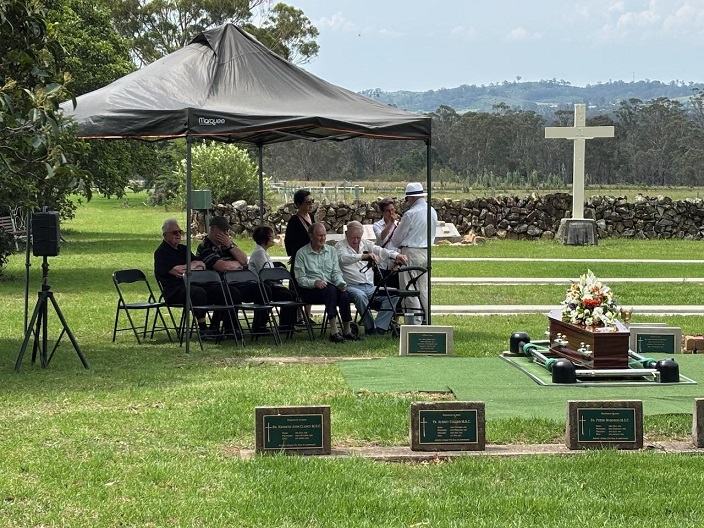
Reverend Fr Paul Guy MSC you are surely a humble and most deserving "guy" of the highest recognition as the most unannounced deserving "monsignor" for your humble Pastoral care and personal sensitivity to all the half-cast mixed race population in Port Moresby, Bereina, Central Province and the rest of PNG.
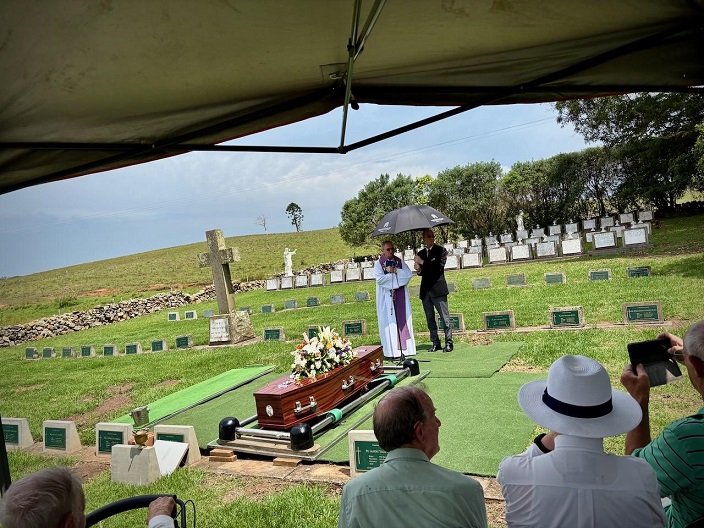
And in your exact word, you reminiscently boasted that, "you (I) baptized them, you (I) heard their first sincere confessions, you (I) celebrated and gave them their First Holy Communion in their respective Parishes, you(I) prepared them for their solemn celebration of the Sacrament Confirmation, you(I) celebrated and joined them in Holy Matrimony, and surely you happily cried with them and buried them in their respective cemeteries in Hanuabada, Badili, Boroko, Gerehu, Hohola. 9mile, Bereina, etc, in all these Parishes, Churches, schools, institutions Cemeteries.
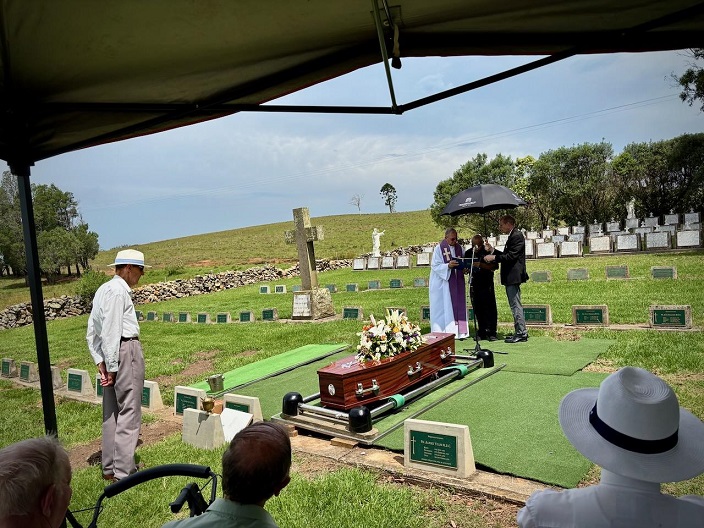
With thanks to John Walker MSC for screen shots of the Mass and graveside photos.
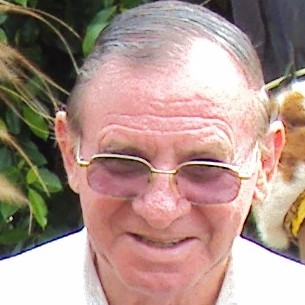
The Chevalier Family Justice Consciousness Reminder - First Friday
Green Border/ Zielona Granica
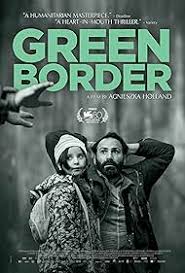
GREEN BORDER/ ZIELONA GRANICA
Poland, 2023, 152 minutes, Black-and-white.
Jalal Altawill, Maja Ostaszewska, Behi Djanati Atai, Tomasz Wlokok.
Directed by Agnieszka Holland.
Here is a sombre and demanding film – demands which should be made on world audiences, considering the events dramatised here, from October 2021 to the epilogue, February 22, 2022, the day of the Russian invasion of Ukraine.
For a moment, before the opening credits, there is an aerial shot of green trees – but, then, 150 minutes of sombre black and white, images and issues in stark black and white. This film was co-written and directed by veteran Polish director, Agnieszka Holland, who has been making films for almost 50 years, in her native Poland in communist times, and moving into Western Europe and many films and contributions to television series in the United States. Agnieszka Holland clearly identifies with the issues raised here.
For almost 40 harrowing minutes, we initially share some hopes with a Syrian family, refugees for Sweden, flown into Belarus, but becoming political and military pawns on the Belarus/Polish border, maltreated by border police on each side, and tipped, literally, over the border and back, a reminder that brutal and inhumane guards were not limited to the Polish concentration camps of World War II. We get to know the family well, parents, two children and a baby, an old grandfather, devout Muslim, a teacher. On the plane they meet a refugee from Afghanistan, an older woman, Leila, who joins them in their quest, victim of people smugglers, in their most unrelieved sufferings, a strong character with whom we can identify, especially in her subsequent fate.
The action then switches to the border guards, the political imperatives on both sides, government authorities not wanting the refugees, guards with a sense of duty but also the callously carefree attitude towards life, including their own. However, one guard, wife pregnant, witnesses what happens – and his conscience is stirred.
Then there is a chapter on the activists, earnest and committed men and women living near the border who are aware of what is going on, being forbidden to go into an “exclusive zone”, trying to rescue the refugees or to secretly bring them some kind of comfort and healing. There is a focus on a psychiatrist who is moved by the situation, volunteers to help, finds herself as the target of the border guards.
While there is some hope, some humanity in key characters, the film is a reminder that in the 2020s, savage wars are still fought around the world, invasions, civil wars, starvation, the desperate need for peace.
And, as mentioned, the film ends at the Ukraine/Poland border, and the information that Poland had received 2 million refugees from Ukraine – and the sad reminder that the hostility towards refugees from Asia and Africa is still sometimes virulent.
- A significant film about Europe in the early 2020s?
- The title, the opening aerial shot, the green, then black-and-white, the sometimes starkness of the black and white? And the musical score?
- The director, her Polish background, history, the history of Poland and Belarus, the communist era, post-communism, 21st century, political alignments, refugees from Asia and Africa, harsh stances and behaviour? And the epilogue of the invasion of Ukraine by Russia?
- The chapters, the focus on the family first, the contrast with the border guards, the further contrast with the activists, the focus on Julia and the connection of the stories?
- The plane ride, the refugees from Syria, the boy, Leila and her glasses, his picking them up, changing seats, the window, in the cloud, his father, the grandfather translating? The mother and the baby, the little girl? The background, refugees, the plan, through Belarus to Sweden, the financial arrangements? The establishing of the characters and audience response?
- Arrival in Belarus, the connection, the van, Leila coming with them, driving to the border, the oppressive driver, the demand for money, the previous payment, and being offloaded? The harsh experience in Belarus, the guards, operation, food and water, phones, batteries dying, trying to communicate? The response of each of the characters, the mother feeding the baby, lacking milk, the father and his desperation, the children and their needs? The old grandfather? Leila with them, her plea about Afghanistan? Their being tipped over into the Polish border, the barbed wire? The experience of the Polish guards, the repetition of the oppression, and then back into Belarus?
- The guards, the politics, attitudes of the government, Europe and refugees, harsh Polish stances, Belarus exploitation and the European Union? The treatment, the camaraderie, the carelessness, the exclusive zone? Day and night? The guards together, drinking, talking? The focus on Jan, his pregnant wife, the lecture and the instructions of the commander, callous, concern about his wife, the visit, the scan? His wife at the supermarket and the scorn for the refugees? At home? The bond between husband and wife? Jan, that the challenge to his consciousness, conscience, later the van, letting it through? And his returning home?
- The activists, the leader, her sister, the men and women, living near the border, their concern about the refugees, the exclusive zone, the vehicles, interactions, the pinning of the locations, and to help, medication, food, the Syrian family? Leila, crossing the border, with the little boy, their trek, the call to them, in the night, in the quicksand, the boy dying, Leila rescued, the hospital, her talking to the camera, begging forgiveness? Her later treatment, hospital, the documentation, plea for refuge?
- Julia, at home, therapy by Zoom, her husband dead from Covid, the encounter with the activists, her being moved, letting them come to her house, erratic sister, the leader, the man, the young couple, going out on expeditions, eluding the police, the driving, going to the zone, encountering the suffering people, the Moroccan man, his phone call, the soup, their leaving him, the rules, survival? Julia’s return, his absence? The decision always to go to those in need, young African men, her helping them, her arrest, the treatment in prison, her lawyer, coming out, the activists moving out, the erratic sister staying? The graffiti on the car, her asking her friend to lend her car, the discussion and her refusal? The driver with the towaway, the concealing of the refugees, the going to the house of Julia’s client, speaking French, the cheerful young men, the family meal, listening to music and singing? Signs of hope?
- The situation in 2021, the narrative, the docudrama, the harrowing emotions, compassion, desperation?
- The epilogue, the railway station, the 2 million refugees in Ukraine, Jan at the station, Polish compassion, yet the final information about the prejudice against the African and Asian refugees, and the conflict remaining on the Belarus Polish border?
Conclave
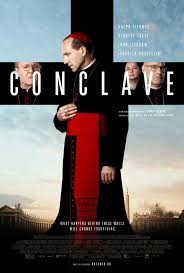
CONCLAVE
UK, 2024, 120 minutes, Colour.
Ralph Fiennes, Stanley Tucci, John Lithgow, Lucian Msamati, Jacek Koman, Brian F.O'Byrne, Isabella Rossellini, Valerio Silva.
Directed by Edward Berger.
Many audiences will be eager to see Conclave because they have read Robert Harris’ exciting novel, the story of the death of the Pope, the gathering the Cardinals, the details required by Vatican regulations, the need for security, the holding of the conclave and the election of a new Pope.
The Catholic audience, especially those with a familiarity with the workings of the Vatican, the nature of the hierarchy, the different perspectives, even of popes during the last half century, a lot to interest, to enjoy, and a provocation especially about stances for going back to consolidate past traditions or an openness to contemporary issues in the wider world and their repercussions for the church.
For non-Catholic audiences, they will enjoy the delineation of characters and their variety, the elaboration of issues, machinations, religious motivations, personal and ecclesiastical challenges. But, it would be by way of observation, the same way non-British audiences may be intrigued by a drama about the intricacies and politics, say, of Britain’s Brexit campaign.
For audiences critical/sceptical about the church, it may seem rather esoteric or politically and ecclesiastically pompous.
But, back to the Catholic perspective. The central character is Cardinal Thomas Lawrence, played in a wonderful performance by Ralph Fiennes, always intense, but, even when not speaking, the audience very conscious of what concerns him, what he is thinking, what is making demands on him. He has wanted to resign as Dean of the Cardinals but the late Pope has refused. Which means that he has to organise the conclave.
So, there we are in the Sistine Chapel, workers in to protect security, the organisation of desks for the Cardinals, the sisters brought in to cook and cater for the conclave, the arrival of the Cardinals, from many different cultures around the world, some pomp and circumstance, some religious earnestness.
To dramatise the different points of view, there is the open-minded Cardinal Bellini, Stanley Tucci, the hoped-for candidate from the “progressive/liberal” attendees. On the other hand, there is the almost crusading, very Italianate Cardinal Tedesco, Pietro Castillitto, with an Italy-first mentality, opposed to contemporary changes, and militantly hostile to refugees making their way to Europe. And there are some complications with an African Cardinal from Nigeria, raising issues of sexuality in the church today, and some realities of sexual abuse. And, on the worldly side, the money-political perspective, there is an American Cardinal played by John Lithgow.
There is an unexpectedly Mexican-born missionary in Congo and in Kabul, who arrives, claiming as having been made a cardinal “in pectore”. Isabella Rossellini plays a very forthright nun who has no hesitation in speaking directly to the Cardinals.
Robert Harris’ novels read very well, compelling, covering a wide range of issues from ancient Rome to 20th century fascist and communist states, to contemporary issues. Which means that he has an interesting story to tell, the filmmakers generally checking to give some kind of authenticity to the storytelling, and an ending which will raise many eyebrows and leave many audiences suddenly shocked and, perhaps, struggling to work out what they think, and some questions for the future church.
- The popularity of Robert Harris’s novel? A papacy story, 21st-century?
- The title, the death of the Pope, the rituals, the gathering the Cardinals, the conclave, the voting, behind-the-scenes? Audience knowledge of conclaves?
- The Catholic atmosphere, Vatican, the Curia, the Cardinals, International, political stances, religious stances, the enclosure, the discussions, the voting, the black smoke, the white smoke?
- The situation of the church, the dead pope, criticisms of his being progressive, his keeping tabs on the Cardinals, his hidden report, keeping Cardinal Lawrence as Dean, his dismissal of Cardinal Tremblay? Lawrence going in to break the seal, finding the document? The ceiling of the room, the removal of the body, the smashing of the ring?
- Fiennes as Cardinal Lawrence, the complete focus of the film on him? The performance, the intensity, communicating the interior questions and doubts? His background, wanting to resign, go to a monastery? His having to organise the conclave? His reliance on O’Malley, Logistics, searching information, interviewing personnel? Mexican priest from Afghanistan? Tremblay and his background? The importance of confidentiality?
- The background of this logistics, the Sistine Chapel, preparation, security, the accommodation, travel by bus, the rooms, the meals together, the sisters in the kitchen? Audiences appreciating such detail?
- The key Cardinals? The Nellie, friendship with Lawrence, progressive, his ideas, his declarations, ambitions or not? To disco, irritating, bombastic, conservative, scheming, his following, his outburst after the bomb blasts, his intolerance, racist perspectives on the African Cardinal? Tremblay, American, the Curia, his manoeuvres, financial benefits for followers, arranging the nun from Africa to discredit the African Cardinal? The Cardinal from Milan, the discussions, his concerns? The range of other Cardinals, International, friendships, groups, smoking…?
- The arrival of the man from Afghanistan, Mexican, his previous mission experience, created a Cardinal, “in pectore”, his arrival, dishevelled, the interview was Lawrence, the discussions about the authenticity, suspicions, acceptance, his background? Presence of the conclave? Lawrence leading the applause from the Cardinals?
- The assemblies, the voting, the rituals, the county the numbers, the variety over the days, the African Cardinal, the incident with the nun in the dining room, his walking out, Lawrence and the discussions with Sister Agnes, with the nun, confession, learning the truth, the confrontation with a Cardinal, his confession, 30 years earlier, a lapse, his hopes to be Pope, the votes for him, his having to withdraw, sitting alone?
- The confrontations with Tremblay, the information from the Monsignor who served the Pope, his drinking, last-minute talking to Laurence? Lawrence conferring with the Nellie? Confronting Tremblay, his immediate 40 reaction? Lawrence going into the patron, finding the document, the public exposure, the humiliation of Tremblay?
- Sister Agnes, her presence, the nuns, forthright, stern, protecting the nun from Africa, standing up to Laurence, sensing the person in the Pope’s room? Her speech, a woman’s voice, the women observing, the strong stand?
- The changes in fortune, the discussions, the Nellie and his challenge to Laurence, their friendship, his later asking for forgiveness?
- The Cardinal from Afghanistan, his visit to Laurence, continually voting for him? Lawrence then voting for himself?
- The tensions in the room, to disco and his behaviour and look? The African Cardinal? Tremblay humiliated?
- The bomb blast, terrorists, Tedesco’s outburst, the speech by the Mexican, his appeal for unity?
- The final vote, the election of the Mexican, his acceptance, the name of Innocent? O’Malley, the information about Switzerland, the Institute? Lawrence talking to the Mexican, the surprise of his situation, the transgender issue? His decision?
- The ending, the future of the church, Pope Innocent, and the revelation? Lawrence looking at the window, the nuns coming out of the building, the end of the film and audiences left to ponder?
Harder They Fall, The/ 2021
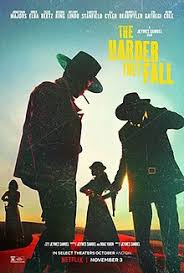
THE HARDER THEY FALL
US, 2021, 139 minutes, Colour.
Jonathan Majors, Idris Elba, Regina King, LaKeith Stanfield, Zazie Beeta, Delroy Lindo, Dion Cole, Michael Beach, R.J. Cyler, Edi Gatghegi, DeWanda Wise, Damon Wayans Jr, Danielle Deadwyler,
Directed by Jeymes Samuel.
The strong Western, using the various conventions of the American West, outlaws, violence, rivalries and politics. What makes it more significance is that it is a film which focuses on African-American characters in the West, very few white characters to be seen. And, as been written Jeymes Samuel, a British writer, producer, director, but also a songwriter and musician. And music featuring significantly throughout this film.
There is a very strong opening, in version of a home, parents and their child, the death of the parents, the leader of the troop, the carving the boy’s forehead – and moving 20 years forward.
The star of the film is Jonathan Majors as the boy growing up, leader of his own group, involved in robberies, but also a journey of vengeance, and his relationships with various members of his group.
The other central character of the film is Idris Elba as the gunfighter who carved the boy, was freed from prison, involved in money dealings, taking over a town, ousting the Mayor, and his followers. And, at the end, quite a revelation about the relationship of the two men.
There is a very strong cast indeed, a range of key actors, African-Americans. There are significant male actors like Delroy Lindo, LaKeith Stanfield, Damon Wayans Jr. But, it is even stronger, the African-American women, Regina King, Danielle Deadwyler, Zazie Beetz.
With seeing as a western, is a picture of the characters in the white American West, playing on the conventions, heroes and villains, and ambiguities of characters and behaviour.
- The title, in the context of the West?
- The settings, the western locations, action?
- The cast, African-American cast? Africans Americans in the 19th century West?
- Nat Love story, as a child, parents, the attack, their deaths, the carving on his forehead, the passing of 20 years, his new life, associates, killing Cortez? The robbery? The news about Rufus block? Nat and his relationship with Mary Field?
- The portrait of the supporting characters, in themselves, their Association with Nat Love, with Rufus Buck? Loyalties, betrayals, shootouts?
- Rufus Buck, at the opening, 20 years later, prison, pardon, the stolen money, his relationship with Trudy Smith, Cherokee Bill, the escape from the train? Killing the corrupt guards?
- Redwood City, wily escape, the mayor, buck whipping him? Escape and the money?
- Marshall Reeves, the arrest, capturing Love, the issues of revenge? The relationship with Cuffee? Mary, the proposal, the refusal? The buying of the saloon?
- The action, the to-ing and fro-ing, between Nat story, Rufus Buck’s story, the deals, the love for Cuffee?
- The wagon, the friends and betrayals, the money, the shootouts? Tesco’s death?
- The confrontation between the women, their fighting?
- Rufus Buck, with Love, the revelation about their father, his abuse, their being half-brothers, the shooting of the revenge? That killing Buck?
- The end, Marshall Reeves, in control, Cuffee in support? The grave? The death of Buck, the freedom for Nat Love?
Caine Mutiny Court-Martial, The/ 2023
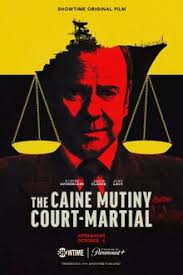
THE CAINE MUTINY COURT MARTIAL
US, 2023, 108 minutes, Colour.
Kiefer Sutherland, Jason Clarke, Jake Lacey, Monica Raymund, Lewis Pullman, Jay Duplass, Tom Riley, Lance Reddick, François Baptiste, Gabe Kessler.
Directed by William Friedkin.
In 1954, audiences worldwide were very impressed by Edward Dmytryk’s film adaptation of Herman Wouk’s celebrated novel, The Caine Mutiny. With a very strong cast including José Ferrer, Van Johnson, Fred MacMurray, the attention was on Humphrey Bogart as Captain Queeg, not the usual kind of character that he played. He was the captain of the ship, his subordinates accused of mutiny against him, the revelation of his character, his fixations, his nervousness…
In 1988, Robert Altman made a television version of the play based on the novel, The Caine Mutiny Court-Martial.
2023 saw a new version of the play, filmed for television, and, in fact, the last film by celebrated director William Friedkin (The Exorcist, Oscar for The French Connection). He directed the film in his late 70s.
Time and location for this story has been updated to the 2020s, specific dates, a situation of mines in the Persian Gulf. And there is all the contemporary technology to draw on. And, another change, the prosecutor has been changed from male to female, now played by Monica Raymund.
There is a very interesting male cast, Jason Clarke at his best as the defender, Jake Lacey in a much more serious role than usual as the officer accused of mutiny, Lewis Pullman as the sinister presence.
The film is dedicated to veteran actor, Lance Reddick, who appears as the presiding judge, a strong role, his last film role.
Where this version differs is that Captain Queeg is not presented initially so strongly neurotic as in the other versions. Here he is played by Kiefer Sutherland, defending himself, speaking forthrightly, the touch of the trembling hands. However, he is later called as a witness for the defence, the defence badgering him, and all his neuroses revealed – especially in the context of the testimony of eccentric behaviour explained by the main witnesses for the defence.
While Captain Queeg is condemned, the defence lawyer gives a speech honouring his service to the country over so many decades, the lawyer drinking, going to a celebratory party, and denouncing the sailor, the novelist, who, insinuating, brought on the fall of Queeg. And the film stops.
It is over to the audience, to relive their experience of the trial, the various testimonies, contradictions, denials, personal motivations, integrity… and make their own assessments and judgments.
- The long popularity of the novel and the film? The stage play the court-martial, Robert Altman’s version? William Friedkin’s version? The updating to the 2020s and contemporary technology?
- The film based on a play, the emphasis on dialogue, interactions? The audience imagining the episodes talked about? The end, leaving the courtroom, in the street? At the party? The musical score?
- The episode, the relieving of Captain Queeg of his office, the situation with the mines, Maryk taking responsibility? The episode seen as mutiny?
- The introduction to Maryk, age and experience, discussions with Barney Greenwald, his appointment a few days before, accepting him as defence?
- The proceedings of the court, the presiding judge, his focus of attention, decisions about objections, his interrogating the witnesses, the decision about reprimanding Greenwald or not? The other members of the bench attentive?
- Greenwald, his background, his tactics, his interviewing the range of witnesses, turning Queeg into the equivalent of the accused, little interrogation of him, awaiting his return? The eliciting of information, description of the episodes about Queeg? The cumulative effect?
- Challee, the prosecutor, a woman in this version, the attitudes, his determination, the questioning of witnesses, the defensive Queeg, her objections, not always sustained? The cumulative effect, her final speech and criticisms of Greenwald?
- Queeg, his presence, the impact, issues of his mental stability, his answers to questions, his explanation of the situation? Maryk listening to him, looking at him?
- Keith, his friendship with Maryk, his explanation of the range of stories about Queeg? Greenwald drawing him out? The contrast with Keefer, the novelist, advising Maryk, friendship with Maryk, the decision to go to the higher authorities, backing out?
- The young sailor, 20 years old, awkward, not familiar with court proceedings, his testimony?
- The witnesses for mental health, the psychologist, the defensive Queeg and his abilities? The intricacies of the cross examination? The doctor, limited experience in his work, of the Navy, his defensiveness?
- Maryk and his testimony, the prosecutor hostile, indicating his limitations of education and comprehension? Greenwald, drawing out the stories, Queeg’s strange behaviour, the stories, the key, the searching of the personnel naked, his testing out all the keys, the bucket of keys? The story of the banning of films? The banning of water because of one man having a shower? The persecution of the men? Maryk and keeping his log, quoting from it, Keefer’s advice?
- Queeg going on the stand, booking, the denials, issues of memory, his nervousness, twiddling his thumbs, the balls in his pocket, Greenwald and his further interrogations, the tangle of the stories, the cheese, the strawberries, his further entangling himself, his beginning to rant, self-justification, his condemnation of the men, their lack of discipline, order, his extremism, shirt hanging out…? Greenwald getting him to read out his positive testimony about Maryk?
- The final effect of Queeg testimony? The prosecutor and her business? Greenwald and his final comments? Talking with Maryk, saying he had murdered Queeg? Doing his duty as a defence lawyer?
- Discussions of mental health, sanity and insanity, signs and symptoms, control, paranoia, self-esteem, self-justification? Perfectionism?
- The aftermath, the issue of the party, whether Greenwald would go or not, his drinking, arrival, his harsh words, the confrontation with Keefer, exposing him as the power behind the throne, Keefer wanting to get Queeg, writing the novel, the money? And throwing the drink and his face?
- The finale, the sudden stop, leaving the audience to assess what they had seen, the defensive Queeg and his long service, yet his failure in command? The role of Maryk, respect and disrespect? Experience? And the malice of Keefer?
Heist Before Christmas, The
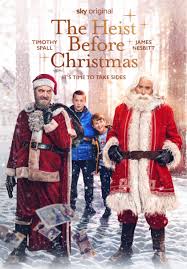
THE HEIST BEFORE CHRISTMAS
UK/Northern Ireland, 2023, 80 mintues, Colour.
Timothy Spall, James Nesbitt, Bamber Todd, Laura Donnelly, Joshua McLees.
Directed by Edward Hall.
Here is a slight and different Christmas film from Northern Ireland. And, it is not necessarily a charming Christmas story.
It opens with a bank robbery by a robber disguised as Santa Claus (James Nesbitt). The focus is on the town, especially young boy, Mikey (Bamber Todd) defying the headmaster, all kinds of mischief, all kinds of bitterness, at home with his single mother and his younger brother, she hard at work to make ends meet.
Mikey realises what has happened, goes in pursuit of the false Santa, discovers an old Santa lyng in the snow, mistaking him for the robber, this Santa being Charlie, a kind old man who imagines himself as Santa Claus and lives in local institution. And is played by Timothy Spall in Norwegian-accented English.
And so, the film moves along, what will Mikey do, can he possibly change, be sympathetic? What about Charlie and his being out there in the snow? And what about the robber, and his tactics to avoid capture?
So, more than a touch of the offbeat, not exactly the nice family Christmas film expected.
- The title, Christmas entertainment? Different?
- From Northern Ireland, the town, homes, shops, banks, the countryside? Carols and the score?
- The edge in Mikey’s behaviour and the possibility of his changing. Different Christmas film? The bank robbery? The bank robber, disguised as centre? Charlie and his dementia and thinking he was centre? The atmosphere in the town, Christmas celebrations, he and his family?
- The picture of the town, homes, shops, offices, the bank, the streets and celebrations, the countryside, the forest, the snow? The car chases and other vehicles? The musical score, Joy to the world?
- The focus on Mikey, his age, his attitudes, causing mischief at school, the reaction of the headmaster, his surliness, defiance, seeing the bank robber and the pursuit, his curiosity, pursuit? At home, his attitude towards his mother, to his brother? Audience response to him?
- The exasperated mother, at home, with the children, Mikey and his attitudes, her eventually slapping him, her upset afterwards? With Joshua, his age, difficulties, the hopes for Christmas, the bike? The poor situation? The mother at work, the boss, her being late, his attitude, her friend? With the customers, the raffle tickets? Joshua wanting the bite? Her changing the bucket of tickets? Not winning the bike, going into the office, discovering the truth, confronting the owner?
- The robber, disguised as centre, the chase to the town, his escape, in the forest? Mikey and his pursuit? Discovering Charlie, the Norwegian accent, talking as if he were centre, dressed as centre, Rudolph’s return…? Mikey returning with the soup, the bank robber, the confrontations, the gun?
- The adventures in the forest, Mikey wanting the money, escaping with Joshua, the continued pursuit? The vehicles? Mikey’s promise? The bag, the money? The slapstick comedy, all the accidents, the fights?
- Back into town, the identity of Charlie, the police, the officer and his laughing at his own jokes, the more sympathetic police officer? Shooting centre? Hospital?
- The pursuits, the climbing, the mother attacking the robber, her fall, the mayhem? Hospital?
- The target audience for this kind of Christmas film? Children? Family? Adults?
Dead Don't Hurt, The
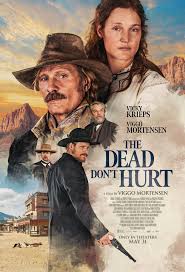
THE DEAD DON'T HURT
US, 2024, 129 minutes, Colour.
Vicki Krieps, Viggo Mortensen, Solly McLeod, Garrett Delahunt,.W. Earl Brown, Danny Huston, Shane Graham, Rafel Plana, Atlas Green, Ray McKinnon.
Directed by Viggo Mortensen.
Now veteran actor, Viggo Mortensen, became a household name when he appeared in the Lord of the Rings trilogy as Aragorn. Mortensen is not only an actor, he is a writer, musician, composer, and has brought all these talents to directing The Dead Don’t Hurt.
In fact, the setting is in the West during the American Civil War. However, the action takes place on the Nevada border and the war itself seems distant. Which means that the film is set in the West, its saloon, gamblers, sheriff, shootouts, but the story is told in such a way that it could take place at any time.
The film opens, significantly because of his title, with a death. There is also a violent shootout in the streets, a court case, a lynching execution. But we have to pay attention because the film moves both forward and with flashbacks, important for the audience to gauge which is which to appreciate the characters and the dramatic development. Sometimes this is something of a challenge.
But, in the flashbacks, we are introduced to Olson, Scandinavian background, arriving in a port, eager to make his way in America. But, the audience has also had a long introduction to a young girl, Vivienne, French background, her father executed by the British, a forthright young girl with an imagination (including a Knight in armour coming to visit her, a scene with which the film opens and will recur). Olson and Vivienne hit it off immediately, some comeuppance to an arrogant young suitor in the town, and they travel to the Nevada border, setting up house, Olson a capable builder, working for some of the money men, profits from gambling, in the local town.
Vivienne is played by Vicki Krieps, the core of the drama and our emotional response.
Audiences need to keep checking on the timespan. After a while, there is a visit and plea from a recruiting agent for serving in the war, Olson, despite Vivienne’s protests, volunteering to go, absent for many years, some letters getting through, some not.
At the dramatic centre of the film is Vivienne’s coping during Olson’s absence, the working in the local bar, hired by the moneyed man, but aggravated by his irresponsible sociopathic son. There are dire consequences for everyone concerned and, gradually, the storytelling arrives back at the violence in the streets, and at the death and dying scene we first saw.
As expected, ultimately, this is also an avenging Western.
The film is intriguing, playing with the audience’s appreciation of characters and story, the interplay and tension between the past and the present – and, with the death, the irony of the title and its implication that The Living Do Hurt.
- The title? Evocative? The opening, Vivienne and her death, the flashbacks, her life and death?
- A variation on Western themes? The era of the Civil War? The Nevada border? Migrants, experiences of war, our, mining, gambling, our in the West?
- The location photography, the beauty, the desert, rivers, ports? The musical score?
- Setting of mood with the opening, the Knight in armour, in Vivienne’s dream, his reappearing during the film, echoes of Joan of Arc, his appearing, reassuring, at her death? Focus on Vivienne’s face, Olsen and his grief?
- The violent episode in the town, at Weston Jeffries, cold, calculating, arrogant, the shootings, the death of Billy? The response of the Mayor, going to the grave, Olsen burying his wife, Vincent present, the story of the violence in the town?
- Court case, the victim for the killings, the religious righteousness of he judge, the woman in the court defiant, guilty verdict, the hanging? Olsen observing and leaving?
- Olsen and Vincent leaving, riding through the countryside?
- Audiences adjusting to the time sequence, the bulk of the film being flashback, the story of Vivienne, French, her parents, the war, her father hanged? In the Port, the relationship with the wealthy man, his treatment of her in the restaurant, her defiance, her attraction to Olsen, talking, going off with him, taking him to the house, the art gallery? Forming a bond?
- Olsen in the town, his background, war? Travelling with Vivienne, the land, setting up, his building talent, working on the other barns? Vivienne upset at first, the flowers and trees, their life together? Her going to work in the bar, the older Jeffries and his power, the discussions with the mayor, the financial deals, the gambling, the adjacent houses, prostitution? The manager of the bar, some integrity? Weston Jeffries in the bar, his arrogance? The violent episode with Weston Jeffries and the piano player, the song, the brutality, commanding him to play? Vivienne and later support of the pianist, his family, the daughter, learning French?
- Olsen, the Civil War, the recruiter in the bar, his deciding to join the Army, Vivienne and her upset, his leaving? Away for so many years, the letters, some received, some not?
- Vivienne, managing, the house, her independence, at the bar? Weston Jeffries following her, her cat in cutting, the violent rape, the aftermath, in the bar?
- Her pregnancy, giving birth, the child, the years passing, the bond between mother and son? Life in the town? Olsen and his eventual return, the important sequence revealing the child, Vivienne quietly spoken, Olsen and his response, leaving, in the river, swimming? His anger at Jeffries?
- The boy, his manner, with Olsen, the acceptance, the building and Olsen showing his son how to hammer? The possible good life?
- The request for Olsen to become sheriff, the discussion with the Mayor, his office? Billy and his delivering the letters, his becoming the assistant? But the audience knowing from the beginning what was to happen?
- Vivienne, illness, syphilis, from Weston Jeffries, the dangers, her death and her vision? The burial?
- Olsen and Vincent, riding, the encounter with Weston Jeffries, the guns, the confrontation, Olsen throwing the knife, overcoming him?
- The story continuing, Olsen and Vincent arriving at the ocean, contemplating the ocean? Sadness, regrets, hopes?
Hoa MSC, placement at Monivae - and a Ted McCormack MSC PS
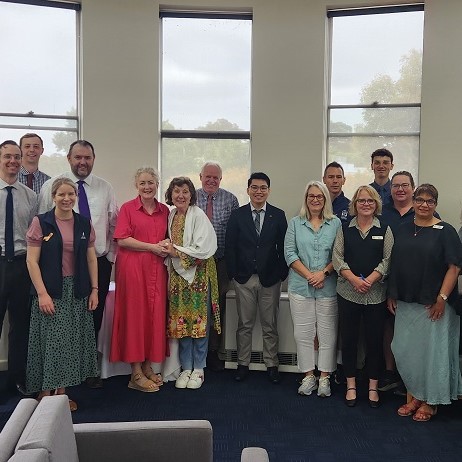
We invited our MSC student, Hoa Tran, to reflect on his time at Monivae.
He writes: this semester, I've begun my summer pastoral placement at Monivae College in Hamilton. Psychology describes the Primacy Effect. It’s the tendency to remember the first experiences most vividly. My first day at Monivae was no exception. After meeting with the principal, Johnathan Rowe, to organise my activities during the placement. He then took me to the Year 8 Reflection Day at Cyril Lampard in Hirl, a short drive from the school.
As we drove, we talked about Monivae and its day-to-day life. I was eager to learn about teaching and all the administrative procedures. Most of my questions were around those areas. But just before we arrived, Johnathan shared something unexpected. "Hoa," he said, "I think the most important thing here is about relationship.” This simple yet powerful saying has reshaped my expectations. It has set the tone for all my experiences at the school.
Education then is not just about academics alone. It is firstly about connection and community. That's what Monivae experience has come to mean for me. The school’s mission statement beautifully puts it: “Monivae College is a heart-centred learning community that embodies the core MSC values of love, positive relationships, and compassion.”
At the Year 8 Reflection Day, I saw this relational dimension in action. Danny Franc, Monivae's Director of Faith and Formation, and other teachers tailored the activities to enable students to know and connect to one another like group discussions, contemplative walk, or create arts work. For me, one memorable activity involved crafting a paper heart and writing down a message of gratitude to someone they appreciate. This activity beautifully expressed the day's theme: "I will remove from your body the heart of stone and give you a heart of flesh.” (Ezekiel 36.26).
It’s hard to put into words all my experiences at Monivae. There’s so much to share. I feel truly blessed to have had the opportunities to join various teams, Religious Education, Humanities, Science, Learning Support, Well-being, Library and the Mental Health First Aid teams. The teachers and staff welcomed me into their classes and training sessions. They allow me to learn and witness their commitment to MSC core values of compassion and community.

What has made this experience even more special is their trust in letting me share my own journey with the students. I’ve had the chance to give them a glimpse of life as an MSC and draw from my pastoral experiences in different places over the years. It’s been so great to engage with the students, not just as a teacher but as someone walking a little further along the path of life, sharing stories and lessons along the way.
So far, my time at Monivae has been an invaluable experience.
- and a Ted McCormack PS. Ted and Hoa recently visited Koroit (Terry Bowman's home town) and Port Fairy (Peter Hearn's home town). Ted lives at Monivae.